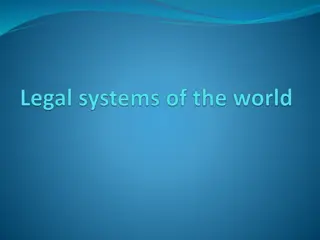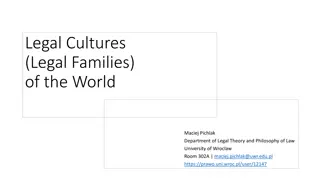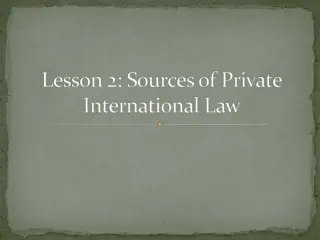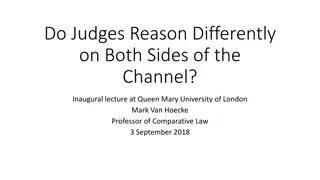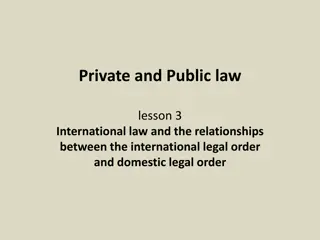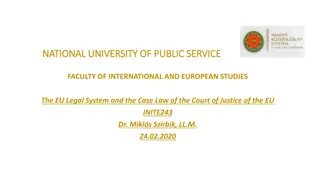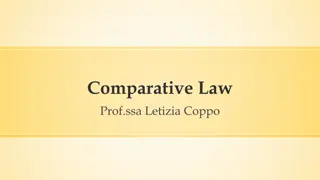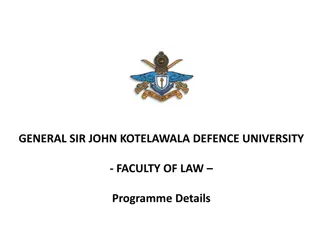The Significance of International Law in Legal Education
Effective curriculum development in legal education is essential to meet the evolving needs of society. The study of international law has gained importance due to globalization, leading to its integration in law school curricula. Incorporating international perspectives alongside domestic law courses is crucial for a comprehensive legal education. The course on international law plays a crucial role in shaping the next generation of lawyers by providing a deeper understanding of global legal frameworks.
Download Presentation

Please find below an Image/Link to download the presentation.
The content on the website is provided AS IS for your information and personal use only. It may not be sold, licensed, or shared on other websites without obtaining consent from the author. Download presentation by click this link. If you encounter any issues during the download, it is possible that the publisher has removed the file from their server.
E N D
Presentation Transcript
THE PLACE OF INTERNATIONAL LAW IN THE LAW SCHOOL CURRICULUM PROF. (Dr.) R.VENKATA RA0, Vice-Chancellor, National Law School of India University, Bangalore, India PROF. R.V. RAO, NLSIU, BANGALORE, INDIA 9/18/2024 1
BACKGROUND The purpose of effective curriculum development should be to meet the needs and current demands of the culture and the society. Therefore curriculum development and the educational reform process continually undergo review, revision, and constant change. Curriculum development can be challenging involving all stakeholders. Though the meaning of curriculum has been defined in various ways, in a more acceptable way it may be defined as a modus operandi to collectively describe the teaching, learning, and assessment practices and materials available for a specific course or program. PROF. R.V. RAO, NLSIU, BANGALORE, INDIA 9/18/2024 2
In a specialized course on international trade law, though it might include certain other relevant ancillary areas of study, the emphasis should not be out of proportion. This theoretical discourse on curriculum development will be incomplete without taking into account another postulate, a continuous appraisal of the curriculum. The effects of globalization have led to expand and deepen the study of international law. Jeffery Atik and Anton Soubbot view that the marginalization of international legal study in U.S. law schools has given way to a new kind of recognition of its indispensability as a consequence of which a number of law schools have started a full course of international law. It meant that the study of international law should have to be as fundamental as torts or civil procedure in the formation of the next generation of lawyers (Jeffery Atik and Anton Soubbot, International Legal Education, 36 INTERNATIONAL LAWYER, 715 (2002)). PROF. R.V. RAO, NLSIU, BANGALORE, INDIA 9/18/2024 3
The purpose of allowing the course should be to make it more competitive and the apprehension of Judge Arthur Vanderbilt that the course on international law is the most neglected has to be constructively understood In the case of United States v. Alvarez-Machain decided by the US Supreme Court. Justice Rehnquist, for the Court, pronounced that the alleged violation of international law principles was a matter for the executive branch. The view of Larry Cata Backer that integrating international perspectives with the domestic law courses is preeminently required task while carving out courses on international law but requires to be executed for the realization of the objective of internalizing international law with the domestic law. As we reached the end of the twentieth century, there came an array of areas, whether human rights, trade, environment or criminal law, moving towards, what Koskenniemi called, global rule of law PROF. R.V. RAO, NLSIU, BANGALORE, INDIA 9/18/2024 4
Koskenniemi stated in his other work, From Apology to Utopia, the consequences resulted in structural bias in support of specialization in the place of traditional hierarchies. Andreas Fischer-Lescano and Gunther Teubner recall Niklas Luhmann's prediction on the future of global law in their speculative hypothesis that international law would undergo sweeping changes through fragmentation , a transformation from normative, that is politics, morality and law, to cognitive, economic, science and technology. The prediction of Luhmann became reality and the Project on International Courts and Tribunals has identified hundreds of international institutions enjoying independent authorities in decision making. In view of steep and stable fragmentation there does not appear to be reversion to normative unity of global law. (Martti Koskenniemi, FROM APOLOGY TO UTOPIA, 600-615 (2005)). PROF. R.V. RAO, NLSIU, BANGALORE, INDIA 9/18/2024 5
REASSESSMENT OF CURRICULUM Notwithstanding the events precipitating fragmentation in international law by the process of globalization there is strong case for a basic course in international law. The most important aspect is to reflect on the demands for the reforms in a generalized course of the globalized environment. As far as formulating a basic course in international law the issues of components to be taken into it would have to be addressed. the basic course has to be invigorated to the new state of affairs. Both international and internal dimensions have to be harmoniously assimilated into the basic course so that it becomes a facilitator in the application of those tools in the specialized courses. An identifiable significant goal, in the first place, could be, what professor Alex Aleinikoff referred to, comparative goal , learning about other systems which would enable in the evaluation of their own structure. He was also emphasizing upon identification of cross-border problems to facilitate a more relevant fabric PROF. R.V. RAO, NLSIU, BANGALORE, INDIA 9/18/2024 6
In the last few decades international law scholarship has been faced with the process of proliferation and specialization of its primary norms as well as with the proliferation of secondary norms. This process, called fragmentation, in international law has caused stirring impact on legal study. Causes for fragmentation may be varied. Generally, it may be said, the idea of fragmentation arises in an environment in which normal or absolute uniformity may not be there The debate here is about formulating an appropriate curriculum in each area of specialization assimilating in it all the relevant developments. Moreover, there is a strong case for including a general and theoretical discussion on fragmentation in the basic course itself. PROF. R.V. RAO, NLSIU, BANGALORE, INDIA 9/18/2024 7
HARMONIZING CURRICULUM WITH DOMESTIC SITUATION. What is most challenging and highly intriguing is the question of harmonization. It should be an endeavour to explore and exploit international norms, whether general or specialized, to address domestic issues. It is easier said than done. The extensive development of international law in a way has made the harmonization an upheaval task. .The ingenuity in orchestrating domestically adoptable curriculum in international law depends upon appropriately harmonizing international law to the needs of domestic situations without at the same time compromising the established international norms of the relevant instrument. PROF. R.V. RAO, NLSIU, BANGALORE, INDIA 9/18/2024 8
The subject of curriculum development has to be understood not as a collection of various components traditionally considered to be part of an area of study. First, it has to be perceived in an unorthodox perspective paying greater attention to international dimensions of the study. Otherwise it would be a cluster of elements without seriously involving with the contemporary realities. Second, it has to be appreciated that it cannot be meaningfully compartmentalized. There has to be a meaningful commingling of elements of other curriculum studies with the curriculum under preparation. Third, it cannot be squeezed to limit only to national boundaries. Consequent to Globalization an element of dominance has to be given space in the curriculum. It should not be considered as an advocacy to global identical or common curriculum. It is an endeavour to bring in global standardization in the process of curriculum development. Fourth, it is crucial that the curriculum should also venture into the paradigm of research with multiple research goals prospective. PROF. R.V. RAO, NLSIU, BANGALORE, INDIA 9/18/2024 9
PROF. R.V. RAO, NLSIU, BANGALORE, INDIA 9/18/2024 10






